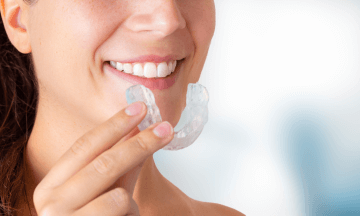

Have you recently had your partner or parent tell you that you grind your teeth during sleep or have you caught yourself grinding or clenching your teeth during the day? Grinding, clenching or gnashing your teeth is known as bruxism. If you have bruxism, you may subconsciously grind or clench your teeth while awake (awake bruxism) or while sleeping (sleep bruxism). Well, everyone experiences clenching or grinding more than once in their lifetime. It's a bodily reaction to anxiety, trauma or stress. However, severe bruxism can be diagnosed when teeth grinding or clenching occurs on a regular basis. Severe bruxism can cause jaw abnormalities, migraines, tooth damage, and other issues and this requires treatment. What majorly causes Bruxism or teeth clenching is lifestyle habits, such as taking a lot of caffeine, drinking alcohol and smoking. People who drink and smoke are twice as likely to clench their teeth than those who do not. Risk factors that increase your risk of bruxism: Age - It’s common when you are younger and usually goes away or reduces by adulthood. Aggressive nature - People having an aggressive nature, being competitive or hyperactive are at higher risk of bruxism. Stress - Increased anxiety or stress can lead to teeth grinding. Medications and other substances - Bruxism may be an uncommon side effect of some psychiatric medications, such as certain antidepressants. Hereditary - If your family has patterns of sleep bruxism, you might have a risk. Other - Bruxism has been linked to a variety of mental and physiological conditions, including Parkinson's disease, dementia, gastroesophageal reflux disease (GERD), seizures, night terrors, and sleep-related problems such as sleep apnea and attention deficit hyperactivity disorder (ADHD). Types of Bruxism Bruxism can happen at any time of the day or night. Although the grinding movement is the same. It is classified into two types- Awake Bruxism - occurs when you clench your jaw and grind your teeth during the day. It's generally associated with emotional problems. Teeth grinding can be caused by anxiety, stress, or anger. For awake bruxism, you might not require therapy as you might notice it and stop right there. Stress management and learning skills to become more aware can both assist to lessen the frequency of these events. Sleep Bruxism - This type of bruxism involves grinding your teeth while sleeping, which can be harmful because you're not aware of what's going on. Another issue with sleep bruxism is that people are unaware of how hard their jaw and teeth are clenched. They may exert up to 250 pounds of strain, which can result in jaw discomfort and dental issues. Clenching can cause headaches as well. Why is teeth grinding harmful? Teeth grinding or jaw clenching for extended periods of time can result in cracked or broken teeth, fractured crowns and fillings, increased gum disease risk, and higher stress on your jaw joints and muscles. To avoid harming your dental and general health, it’s important to keep an eye out for early signs and symptoms of bruxism. Other reasons bruxism is harmful: Can change facial aesthetics Harms jaw and neck muscles Loss of teeth Teeth wearing down Dental Bruxism or Teeth Grinding Symptoms Bruxism symptoms might be minor at first, but if left untreated they can lead to lasting harm. If you grind your teeth at night, you may experience symptoms when you wake up, but they will go away shortly. Symptoms are typically more obvious later in the day if you clench your jaws during the day. But severe Bruxism needs treatment, chronic bruxism symptoms include: Sleep disruption Flattening, broken, chipped, or loose teeth Teeth enamel that has worn away, revealing the deeper layers of your tooth Increased tooth sensitivity or discomfort Jaw muscles that are tired or tight, or a locked jaw that won't open or close fully Soreness or discomfort in the jaw, neck, or face Pain that feels like an earache but isn't caused by an issue with your ears A dull headache begins in the temples and progresses to the back of the head Chewing on the inside of your cheek causes damage Snoring can sometimes be an indicator of sleep bruxism If you observe any of these symptoms of bruxism, contact your dentist immediately. Even if you're not convinced bruxism is to blame for your symptoms, seeing a dentist as soon as possible will help you avoid further damage to your mouth. Only a dentist has the expertise and experience to perform an oral examination, make a diagnosis, and propose the best treatment choices for you. Managing bruxism Managing bruxism that is linked to Temporomandibular Disorder (TMD) symptoms typically has and requires multiple approaches like Physiotherapy, sleep hygiene, breathing exercises and occlusal splints. Your dentist may advise you on wearing an occlusal splint. An occlusal splint (night-guard), also known as a bite splint, is a custom-made hard acrylic device that fits over the maxillary or mandibular teeth's occlusal and incisal surfaces. For individuals with sleep bruxism, there is evidence to support the use of occlusal splints at night. These splints are designed to keep a patient's teeth slightly apart even when he or she clenches or grinds. This relieves pressure on the temporomandibular joint (TMJ) and may possibly prevent long-term tooth damage. The use of an occlusal splint at night has also been demonstrated to reduce masseter and temporalis activity and discomfort. What can I do to avoid grinding my teeth? To avoid bruxism, follow these steps: Avoid smoking, tobacco, and alcohol, which can aggravate sleep bruxism. Get your teeth checked on a regular basis. A dentist can address tooth grinding early, preventing long-term harm. Treat any other dental issues you may be experiencing, such as misplaced or missing teeth at the earliest. For any other concerns about bruxism, teeth grinding or mouth guard for grinding teeth, book your dental appointment and get consulted by the best dentists in Bangalore.